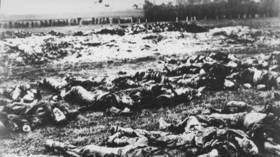
by Scott Ritter at RT
In his 1998 classic, ‘The Greatest Generation’, famed NBC journalist Tom Brokow examined the lives and experiences of some of the millions of American men and women who fought in the Second World War.
“At a time in their lives when their days and nights should have been filled with innocent adventure, love, and the lessons of the workaday world,” Brokow observed, “they were fighting in the most primitive conditions possible across the bloodied landscape of France, Belgium, Italy, Austria, and the coral islands of the Pacific. They answered the call to save the world from the two most powerful and ruthless military machines ever assembled, instruments of conquest in the hands of fascist maniacs. They faced great odds and a late start, but they did not protest. They succeeded on every front. They won the war; they saved the world.” Brokow had “come to understand what this generation of Americans meant to history. It is, I believe, the greatest generation any society has ever produced.”
I was born in 1961, some two decades after the United States entered the Second World War. By this time, the defeat of Nazi Germany and Imperial Japan had receded into the history books, replaced by a new and even more menacing foe, the Soviet Union. My father was a US Air Force officer whose career path up to 1977 looked like a Cold War-era tourist map, with service in Vietnam, Korea, and Turkey. I grew up with the mantra “better dead than red” drilled into my head, convinced that the service my father was providing to our nation was essential for the survival of the free world.
In 1977, my family moved to West Germany. My father had been reassigned to the 17th Air Force, headquartered at Sembach Air Force Base. We opted to live off base, in “the economy” as we called it, eventually settling into a magnificent house in the village of Marnheim owned by a German family who had been renting it out to US servicemen for decades. The house had a history, too. In 1945, it had served as a temporary headquarters for General George S. Patton as his 3rd Army advanced through the Rhein Pfaltz region of Germany during the Second World War.
We were three decades removed from that war when we moved to Germany, but reminders of that conflict were all around us. I spent the summer of 1978 working in a meat inspection facility staffed by what we euphemistically called “DPs,” for “displaced persons.” When the Second World War ended, millions of Europeans who had been enslaved by Nazi Germany found themselves liberated from their prison-like existence, but with no home to return to. This population included many children. The United States provided many of these permanently displaced persons with jobs and a place to live. For thousands this existence became a way of life, and they were employed in service of America’s expansive military presence in West Germany. By the time I became acquainted with the “DP” community, some 33 years later, these children had grown into adults who were deeply grateful for the opportunities provided by the United States.
They were also deeply resentful of the German people for having imprisoned them and destroying the Europe of their childhood.
The experience of the “DPs” was a wake-up call for an American teenager who, by living among the Germans, had grown to view them as simply a foreign-speaking mirror image of myself and my family. But it wasn’t that simple.
In January 1979 West German television broadcast, over four consecutive nights, the ABC miniseries ‘The Holocaust’. After each episode, the Germans ran a live panel of historians who would take questions from the audience (it is estimated that over half of Germany watched the series.) Like most Americans living in Germany, I had missed out on the series when it was originally aired in the United States the previous year. My family tuned in and, out of curiosity, remained tuned in during the panels. We were shocked by what we heard – the children of Germans who had been alive during the Second World War were calling the panel, in hysterics, denouncing their parents and their nation for allowing such a thing to happen. The distinguished academics and psychologists that had been assembled for these panels were stunned into silence by the outrage and anger – they simply had no answer to the question of not only how such a thing had been allowed to happen, but why they had not been taught about it growing up. Germany, it seemed, had tried to erase the criminality of its Nazi past from its present reality.
As focused as my family was on living less than one hour’s drive from the border between East and West Germany where, on the other side, hundreds of thousands of Soviet soldiers were stationed, poised (in our minds, at least) to launch an attack at any moment which would bring our idyllic life to a sudden and horrific halt, we could not escape the constant reminder of what had transpired on the European continent a scant three-and-a-half decades past.
One of the most poignant reminders lay across another border,…
Continue Reading
